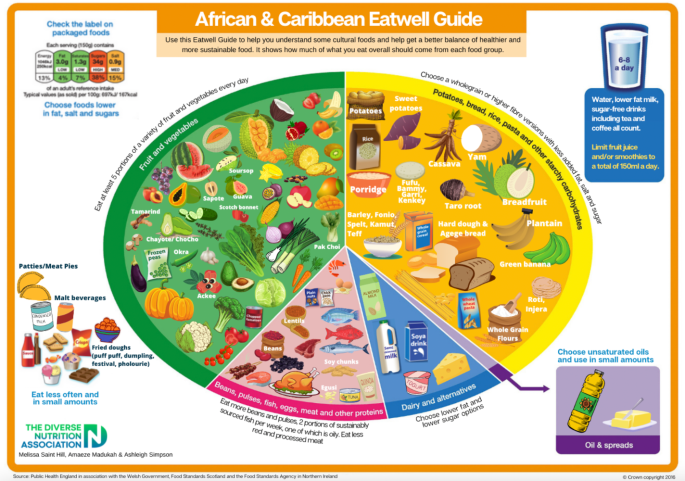Within the UK the culinary landscape is incredibly diverse, with easy access to a wide array of global foods due to importation. Most individuals can stroll into a supermarket and find an assortment of fruits and vegetables from around the world, alongside the increasingly popular world food aisles in larger supermarkets. However, while this may seem convenient, it may not necessarily promote a successful pursuit of a healthy and sustainable diet, and it can even pose challenges to ethical and economic considerations.
What is a sustainable diet?
A sustainable diet encompasses a holistic approach that takes into account economic, environmental, social, and ethical considerations. Its purpose extends beyond individual well-being, extending to the well-being of our planet.

The need for culturally appropriate nutrition advice was a common factor expressed by the black African and Caribbean community in various settings that the Diverse Nutrition Association experienced in their field of work as nutritionists. The common concern was that cultural foods were absent from healthy eating resources that they were being given. From this, a survey was completed, which led to the creation of the African and Carribean Eatwell guide. This is a downloadable guide that still captures the food groups present on the original eatwell guide, whilst adding culturally appropriate foods. Health professionals can use this guide to start a conversation to discuss healthy culturally appropriate foods.
A crucial task for professionals is to encourage and empower individuals to understand that their cultural diet can be both nutritious and sustainable, the following strategies can guide us in achieving this goal:
Top tips for adopting a nutritious and sustainable diet:
Purchasing foods in season from their place of origin - for example, mangos are in season in the Caribbean between July and August so you may see them in your local shop more often. This is also typically reflected in the price of the produce, as more in season means the price may be cheaper. Consider the impact of seasonal choices not only within the UK but abroad.
Eat a more plant-based diet - this may include more fruits and vegetables, beans and pulses. The African and Caribbean Eatwell guide provides a culturally sensitive example of where foods fit for those within this culture.
Encourage the exploration of plant-based proteins, in order to reduce meat consumption. While this might not be common in some cultures, it can inspire creativity in incorporating meat alternatives and diverse protein sources like lean meats, poultry, soya, tofu, beans, pulses, nuts, and seeds.
Choosing sustainably sourced fish- Experiment with different types of fish in dishes, ensuring the authenticity of your meals.. Two portions of fish are recommended weekly, including one oily fish variety.
Eating fewer foods that are high in fat, sugar and salt - Where possible reduce these foods reserving them for cultural celebrations and festivals. Not only for health but also for environmental factors too.
Wasting less food - Being mindful of wasting food, as this has a significant environmental impact. Consider freezing food where possible or get creative with making multiple dishes from a single ingredient.
These tips highlight that you can enjoy a diet that is not only nutritious and sustainable but also celebrates the rich tapestry of culture from around the world.
What would it mean to have a healthy and sustainable diet that is culturally inclusive?
For an individual, this is the ability to have a sustainable diet whilst enjoying one's cultural dishes. For professionals supporting and providing recipes that are not only sustainable but what is culturally sensitive.

